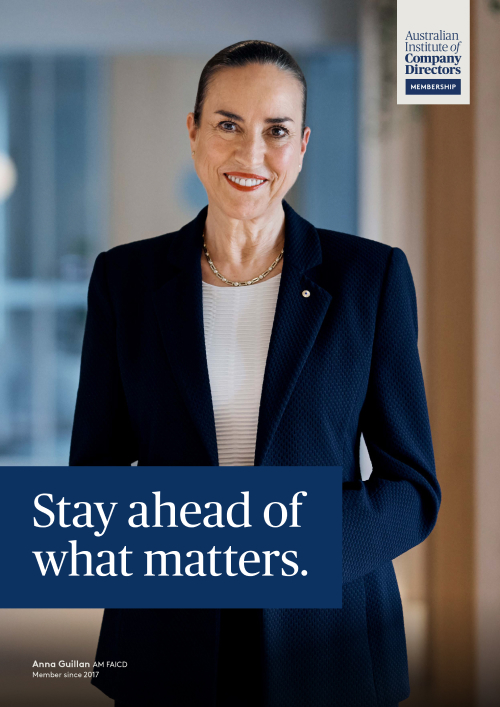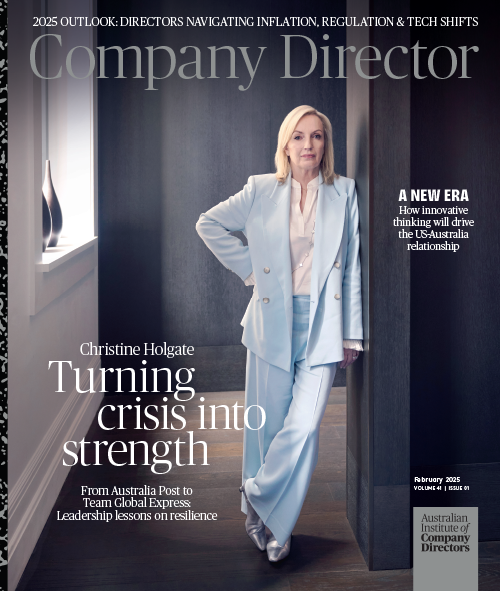The Workplace Gender Equality Agency (WGEA) has published pay gap data (base salary and total remuneration) for private sector employers with 100 or more employees.
“Publishing employers’ gender pay gaps brings transparency to those employers who have low median gender pay gaps and those who don’t,” says WGEA CEO Mary Wooldridge GAICD (pictured above). “Change takes action and employers need to double down on ensuring all employees are fairly represented and equally valued and rewarded in their workplace.”
The results show that:
30 per cent of employers have a median gender pay gap between the target range (minus five per cent and plus five per cent)
62 per cent of median pay gaps are over five per cent and in favour of men
The rest (eight per cent) are less than minus five per cent and in favour of women
Across all employers, 50 per cent have a gender pay gap of more than 9.1 per cent.
The individual employer gender pay gaps can be found using the agency’s Data Explorer tool.
There is significant variation in the gender pay gap across different industries, ranging from the construction industry, where the midpoint pay gap is 31.8 per cent, to the accommodation and food services industry, which has a pay gap of 1.9 per cent.
The agency says all employers should be aiming for a gender pay gap within (or including) plus or minus five per cent.
“This range allows for normal business fluctuations and employee movements, while signifying that an employer has a focus on identifying and addressing inequalities, and is taking action to ensure there is gender equality throughout an organisation,” says Wooldridge.
ASX update
The ASX Corporate Governance Council has released a consultation draft with updates to the Corporate Governance Principles and Recommendations.
The AICD is a member of the council and feedback is sought by 6 May 2024. Among the proposed changes are those relating to non-executive director remuneration; disclosure of material risks as assessed by the listed entity (a shift from the current focus on environmental and social risks); stakeholder engagement and board skills. It is proposed that the updated edition of the Corporate Governance Principles and Recommendations will apply to reporting periods beginning on or after 1 July 2025, although the council also invites views on timing.
Emerging trends
Diversity, AI, ESG initiatives and the higher standards of governance required of private companies are hot topics for businesses and their boards.
The Russell Reynolds Associates Global Corporate Governance Trends for 2024 report shows that more than 30 per cent of S&P 500 companies – and roughly 17 per cent of Russell 3000 companies – addressed AI in their proxy statements last year. It forecasts that shareholder proposals on the subject will likely increase in 2024, emphasising AI governance, the effects on the workforce and the ethical use of AI.
It predicts more action — less talk — on ESG initiatives and, for boards that are closer to gender parity, continued attention on gender diversity and a renewed focus on other forms of diversity.
Access the report at bit.ly/3P4nyTQ
New reporting rules
Not-for-profits (NFPs) are advised to check requirements with the Australian Taxation Office (ATO).
New reporting rules for NFPs start this tax time, says the ATO’s assistant commissioner, Jennifer Moltisanti. Tax law outlines eight categories of NFPs that can self-assess as income tax exempt. Under the new rules, an NFP must lodge an annual self-review return, indicating which category it falls into, to be entitled to income tax exemption.
NFPs can contact the ATO if they need help understanding the new reporting requirements.
This article first appeared under the headline 'Pay Gap Priorities’ in the April 2024 issue of Company Director magazine.
Latest news
Already a member?
Login to view this content




